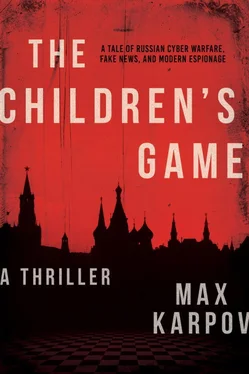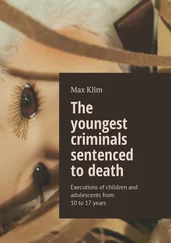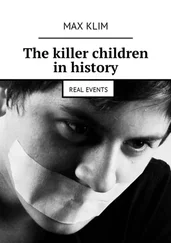Delkoff nodded, careful not to show enthusiasm. “And how do I know I’m not being set up?”
“You don’t,” Turov said. “But you know that I pursued you. You know that we have common concerns and can help each other. You’ll have to trust me.”
Delkoff was silent. He did trust him, that was the strange part of this: there was something reassuring in Turov’s face, in his steady manner and physical ordinariness. It made you stop noticing what he looked like and enter into the realm of his thoughts and ideas. When they shook hands, Delkoff noticed that Turov was wearing a cheap off-the-rack jacket, the sleeves slightly long, and that assured him, too—as if, in a sense, they were wearing the same uniform.
As the cargo van returned Delkoff to central Moscow, he felt as if some of Russia’s divinely inspired historical mission had just been handed to him. The same music played tinnily from the van’s speakers but it sounded different now: a triumphant Russian melody, which caused Delkoff’s eyes to sting with emotion. Betrayal out of loyalty to a higher cause is no longer betrayal, he thought, a line he knew from school days, although he couldn’t recall who’d said it. Gogol, perhaps. Or Tolstoy. Like many of his generation, Delkoff had been raised believing in Soviet greatness without ever actually having seen it. His father had made it seem tangible, like a place that he would visit someday, and he’d felt its proximity all of his life: in the country’s patriotic songs and ceremonies, in the monuments and brick ramparts of Red Square, in his own son’s decision to join the military; sometimes he heard it early in the morning now, just in the way the poplar trees rattled outside his apartment windows, a haunted sound that he thought of as the whispers of dead soldiers.
Delkoff believed in Russia’s destiny as a great power, which would one day span East and West—a dream that still burned in many Russians. But there was a street-level battle under way now that had made his country’s greatness harder to see, particularly in Moscow, where new skyscrapers and construction cranes had stolen the skyline, and vulgar Western billboards overpowered the historical monuments. Perhaps this was what Turov meant by “complicity.”
Still, Delkoff did not know for certain that this assignment was not some elaborate setup. He considered that as he rode the crowded Metro train back to his apartment in Troparevo. It was still possible that someone would surprise him in the hallway of his apartment house as he stepped from the elevator, as other Kremlin critics had been silenced on other Moscow evenings.
Nothing happened to Ivan Delkov that night, though. And nothing happened over the next fifteen weeks, as he discreetly implemented Turov’s plan, meeting with the arms supplier Hordiyenko in Kiev and hiring and training the five men who would carry out the mission.
Nothing happened until that afternoon in August, when the world’s eyes suddenly turned again to Russia and history changed.
August 13.
By then, it wasn’t Turov’s operation anymore. By then, it was Ivan Delkoff’s operation.
Tuesday, August 10. Cyclades Islands, Greece.
Christopher Niles stepped out of the sea into a perfect late-morning breeze. Crossing the narrow beach, he smelled flatbread cooking at the taverna next door. He saw Anna Carpenter sitting on a towel drying in the sun, her wet hair pulled back, and felt a tug of gratitude. The first two days of their vacation had been largely rained out, but Tuesday had dawned clear and balmy and there was no rain forecast again until the weekend. It would be a perfect day for their “conversation.”
They had traveled to Greece at Anna’s insistence in order to disappear. To escape the demands of Washington and talk about their future. Disappearing was easier for Christopher now than for Anna, who was a public figure again, the recently elected US Senator from Maryland. In Greece, though, privacy hadn’t been an issue. She’d been recognized on the flight and once at Athens International Airport. But since arriving on the island, they’d been just what they wanted to be: two anonymous American tourists on summer holiday.
Next month, they returned to their respective careers in D.C. Chris would begin a yearlong visiting lecture post at George Washington University, leading a seminar entitled “Russian Spy Craft in the 21st Century.” The class was spun off from a talk he’d given in the spring on the FSB and SVR, Russia’s domestic and overseas intelligence agencies. Next semester, he’d teach “War and Society,” exploring the impact of American politics and public opinion on warfare since World War II. Both drew nominally on his two-decade career as a government analyst and intelligence officer.
If someone had told Christopher Niles three years ago, when he first met Anna, that he’d be teaching and lecturing now, he would have laughed. It wasn’t a life he had imagined for himself. But Christopher’s growing frustrations with his employer—the US government—and Anna’s gentle but persistent prodding had finally conspired to change his mind. What surprised him wasn’t just how easily he’d adapted to academia but also how little he missed intelligence work. All his life he’d harbored a tendency toward obsession, a need to fix big, sometimes unfixable problems. It was a trait passed on to him by his father, which had served him well in his work but often came at a personal cost. Anna had helped with that. Even his physical appearance had adapted, as she liked to say. Christopher still had the rangy build of a college athlete, which he’d been, but his blond hair was turning to gray and he’d taken to wearing glasses, which gave him a studious look more in line with his new job.
They had been together now for two and a half years. But Chris and Anna’s careers, and their independent natures, had so far kept them from making a commitment. Greece was supposed to be about changing that. The plan was to spend six days at the beach, away from electronic distractions, and decide what to do with their life. But they still hadn’t had “the conversation,” deciding to wait until the weather turned. This morning, they no longer had that excuse.
As Chris approached from the water, Anna sat up and watched, smiling faintly. The sand was bright and a little startling this morning after all the rain. Her skin felt warm as they kissed.
“Something to drink?” he asked, drying off, knowing she’d want a strawberry Ouzito from the taverna next door. Anna looked good in the sun, her skin smooth, a small spray of freckles on her nose and cheeks.
Chris walked across the warm sand to the taverna. Inside, two fans stirred the air. Greek folk music played from speakers, all violin and guitars. Waiting in line, he glanced across the screened terrace at Anna, reading her book in a circle of umbrella shade, and something closer caught his eye. On the other side of the screen: a small, slightly disheveled-looking man was pacing the concrete walkway, hands clasped behind him, scanning the beach like a military inspector; a tourist, perhaps, who’d become separated from his wife. But there was something familiar about him—the measured step and breezy wisps of white hair, the short-sleeved shirt, slacks and hard-soled shoes. Not the attire of a man on vacation. In fact, it almost looked like Chris’s old boss, Marty Lindgren.
“Sir?”
“Sorry,” Chris said. He stepped to the bar and ordered two Ouzito cocktails, watching the bartender as she nimbly sliced strawberries and squeezed in lime juice. When he glanced back toward the water, Christopher noticed the man outside looking in through the screen; he recalled a story children used to tell growing up: how everyone has a double somewhere in the world. It wasn’t really true, of course, although he’d often met people who shared the mannerisms of someone he knew.
Читать дальше












